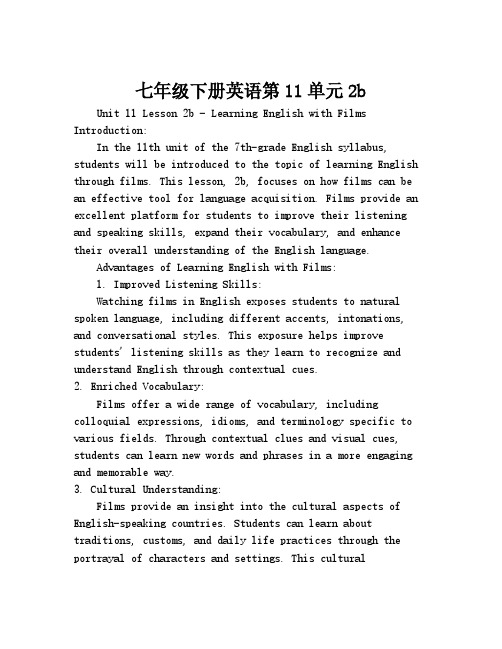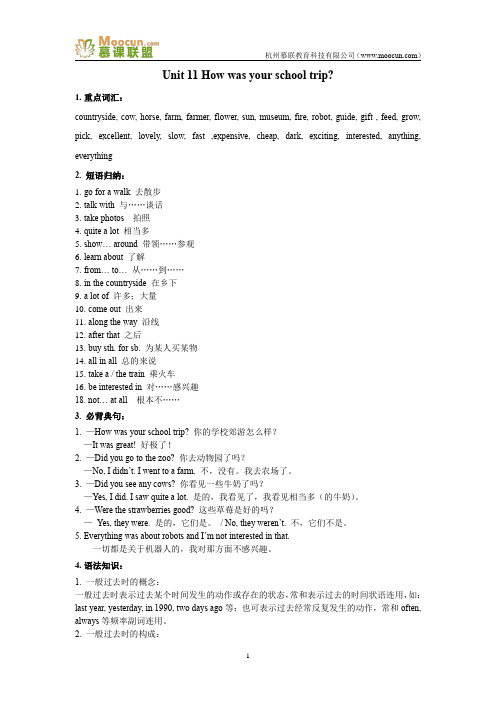七年级下册英语第11单元课件.ppt
七年级下册英语第11单元2b

七年级下册英语第11单元2b Unit 11 Lesson 2b - Learning English with Films Introduction: In the 11th unit of the 7th-grade English syllabus, students will be introduced to the topic of learning English through films. This lesson, 2b, focuses on how films can be an effective tool for language acquisition. Films provide an excellent platform for students to improve their listening and speaking skills, expand their vocabulary, and enhance their overall understanding of the English language. Advantages of Learning English with Films: 1. Improved Listening Skills: Watching films in English exposes students to natural spoken language, including different accents, intonations, and conversational styles. This exposure helps improve students' listening skills as they learn to recognize and understand English through contextual cues.2. Enriched Vocabulary: Films offer a wide range of vocabulary, including colloquial expressions, idioms, and terminology specific to various fields. Through contextual clues and visual cues, students can learn new words and phrases in a more engaging and memorable way.3. Cultural Understanding: Films provide an insight into the cultural aspects of English-speaking countries. Students can learn about traditions, customs, and daily life practices through the portrayal of characters and settings. This culturalunderstanding enhances their language learning experience and promotes global awareness.4. Enhanced Pronunciation: By observing native English speakers in films, students can improve their pronunciation and intonation. They can mimic the actors' speech patterns and practice pronouncing words correctly. This practice contributes to developingtheir speaking skills and sounding more natural while communicating in English. 5. Improved Comprehension Skills: Watching films allows students to practice their comprehension skills by understanding the plot, following dialogue sequences, and interpreting visual cues. This process enhances their overall comprehension abilities and promotes critical thinking. Tips for Effective Film-Based Learning:1. Select Appropriate Films: Choose films suitable for the students' English language level and age group. Opt for movies with clear and understandable dialogues, simpler plotlines, and visual aids to aid comprehension.2. Utilize Subtitles: Start by using subtitles in the students' native language to aid comprehension. As their proficiency improves, transition to English subtitles and eventually watch films without any subtitles.3. Engage with the Film: Encourage students to actively watch the film by taking notes, pausing to discuss scenes or unknown vocabulary, and participating in related activities or discussions afterward. This active engagement enhances their learning experience.4. Follow-Up Activities: After watching the film, assign activities such aswriting reviews, summarizing the plot, or discussing the characters and their roles. These activities reinforce the vocabulary and language patterns learned during the film. 5. Incorporate Group Discussions: Encourage students to participate in group discussions about the film, sharing their thoughts, opinions, and interpretations. This practice develops their speaking and listening skills while promoting collaborative learning. Conclusion: In conclusion, learning English through films offers numerous benefits to students. It enhances listening skills, enriches vocabulary, provides cultural understanding, improves pronunciation, and enhances comprehension abilities. By following the tips mentioned above, teachers can effectively integrate films into their English language curriculum, making the learning experience engaging and enjoyable for students.。
人教版七年级英语下册Unit11_单元主题思维导图

countryside farm museum fire station
Did you see any cows? Yes, I did. I saw quite a lot. What did Carol do? She picked some strawberries. How was your trip last week? It was excellent. Then the guide taught us how to make a model robot. All in all, it was an exciting day.
初中英语人教版七年级下
Unit11 How was your school trip?
单元主题思维导图
Talk about trip
feelings
How was the trip? What did Eric do?
How was the weather?
阅读篇 SectionB 2b
It was _e_x_c_e_ll_e_n_t _. Eric _v_is_i_te_d_ his grandparents in the countryside. He __w_e_n_t_f_is_h_in__g_every day. Hef_e_d_t_h_e_c_h_i_c_ke_n_s_ with his grandpa. It was so much fun.
人教版英语七年级下册单元Unit 11 知识点+测试卷+思维导图

Unit 11 How was your school trip?1.重点词汇:countryside, cow, horse, farm, farmer, flower, sun, museum, fire, robot, guide, gift , feed, grow, pick, excellent, lovely, slow, fast ,expensive, cheap, dark, exciting, interested, anything, everything2. 短语归纳:1.go for a walk 去散步2.talk with 与……谈话3.take photos 拍照4.quite a lot 相当多5.show… around 带领……参观6.learn about 了解7.from… to… 从……到……8.in the countryside 在乡下9.a lot of 许多;大量e out 出来11.along the way 沿线12.after that 之后13.buy sth. for sb. 为某人买某物14.all in all 总的来说15.take a / the train 乘火车16.be interested in 对……感兴趣18. not… at all 根本不……3. 必背典句:1. —How was your school trip? 你的学校郊游怎么样?—It was great! 好极了!2. —Did you go to the zoo? 你去动物园了吗?—No, I didn’t. I went to a farm. 不,没有。
我去农场了。
3. —Did you see any cows? 你看见一些牛奶了吗?—Yes, I did. I saw quite a lot. 是的,我看见了,我看见相当多(的牛奶)。
4. —Were the strawberries good? 这些草莓是好的吗?—Yes, they were. 是的,它们是。
七年级英语下册(浙江专版 人教版)课件 Unit 11 单元同步作文指导

单元同步作文指导
本单元以“学校旅行”为话题,主要描述期间所发生事情的经过及自己 的感受。具体到书面表达中要求同学们会写关于学校旅行的文章,此类 文章以记叙为主,要说明事件的时间、地点、人物、经过和结果。在写 作中,要分清主次,详略得当;另外,由于是写一篇印象深刻的经历, 故文中应有描述性的句子,比如描述人物的心理、感受、天气状况等。 教材中出现的能用于此类作文的句型: ①Today I went on a school trip.今天我参加了学校旅行。 ②I think today's school trip was terrible.我认为今天的学校旅行很糟糕。 ③We took the train to the museum.我们乘火车去了博物馆。 ④We visited the science museum and it was really interesting.我们参观了科 学博物馆,那真的很有趣。
病号3:Everything were about robots in the museum. 【处方】everything为不定代词。不定代词作主语,谓语动词 必须用单数。故句中were应改为was。 病号4:He bought_to_me a new bike. 【处方】“给某人买某物”应表达为“buy sth.for sb.”或“buy sb.sth.”故原句中应去掉to。
【点拨】本文属于以叙事为主的记叙文。写作时首先要审明题意,围 绕“我的学校旅行”组织材料,发挥想象,交代清楚时间、地点、人 物、过程、结果等,要注意在记述当天活动的同时,还要写出自己的 感受,正确运用人称和动词时态。
热点作文练习
上周六你们班同学在老师的带领下,参观了博物馆。请根据下列提 示写一篇短文介绍,活动的过程和你的感受。要求:短文必须包括 所有提示点,不少于60词。 提示:1.出发时间(8:30 a.m.)。2.交通方式(bus)。3.路上所用时间 (about twenty minutes)。4.活动内容(see old things,listening to the guide,watch videos)。5.返程时间及感受(5:00 p.m.,tired,happy and excited)。
七年级下册英语unit 11 Section A第1课时(1a~2d)

第11单元How was your school trip?
【课时建议】 本单元建议5课时
Section A (1a~2d ) (1)
Section A (3a ~3b ) (1)
Section B (1a ~1d ) (1)
Section B (2a~2c ) (1)
Section B (3a ~3c )……………………………………………………………………………………1课时
词汇短语:主要采用图片及多媒体展示助记法。
基本句子:采用多媒体展示及交际法。
语法:般过去时态——采用歌诀助记法。
规则动词的过去式构成方法
过去式构成有规律,一般词尾加-ed 。
词尾有个e ,去e 再加上-ed 。
辅音字母加y,变y 为i 加-ed 。
一辅重闭作尾巴,双写之后加-ed 。
Section A 第1课时(1a~2d
)
布置作业:教师引导学生课后完成本课时对应练习,并预习下一课时内容。
教学说明:
以上周的郊游为话题,引出一般过去时态,简洁明了,直奔主题。
教学说明:
通过听、说、读、写学习训练让学生掌握语言目标——一般过去时态,同时学生的口语表达能力在这一环节得到提升。
人教版七年级下册英语Unit 11单元知识点讲义(学生版)

七年级下册英语Unit 11知识点与语法精讲精练词汇梳理(一)完成单词梳理:名词:1. 奶牛 2. 马 3. 农民;农场主4. 乡村;农村5. 花6. 太阳7. 博物馆8. 火;火灾9. 油画;绘画10. 机器人11. 导游;向导12. 礼物;赠品动词:1. 挤奶 2. 喂养;饲养 3. 种植;生长;发育4. 采;摘5. 听到;听见代词:1. (常用于否定句或疑问句)任何东西;任何事物2. 所有事物;一切副词:1. 相当;完全 2. 昨天 3. 幸运地;好运地形容词:1. 极好的;优秀的 2. 使人兴奋的;令人激动的3. 可爱的4. 昂贵的5. 廉价的;便宜的6. 缓慢的;迟缓的7. 感兴趣的8. 黑暗的;昏暗的兼类词:1. (n)农场(v)务农;种田2. (v/n)担心;担忧3. (adv/adj)快地(的)(二)词汇变形小结:1.feed 喂养;饲养(v.) →____________ (过去式)2.farm 农场;务农(n./v.) →____________ (n.)农民;农场主3.grow 种植;生长;发育(v.) →____________ (过去式)4.lucky 幸幸幸(adj.)→ ____________(adv.)幸运地→ ____________(n.)运气5.paint 幸幸(v.) →____________(n.)幸幸幸幸幸→____________(n.)幸幸6.excite 幸……幸幸(v.) → ____________(adj.)使人兴奋的→ ____________(adj.)兴奋的;激动的7.love 爱(n.) → ____________(adj.)可爱的8.interest 使……感兴趣(v.) → ____________(adj.)感兴趣的→ ____________(adj.)有趣的9.hear 听到;听见(v.) → ____________(过去式)【练一练】用所给词的适当形式填空1.I ____________ (feed) some chicken with my grandparents yesterday.2.Your photos are ____________ (love). Do you want to see some of ours?3.My friends and I are ____________ (interest) in English.4.There are different kinds of ____________ (flower) in the park.5.The villager often ____________(grow) strawberries. His strawberries sell well.6.She was very ill, but ____________ (lucky) she is now out of danger.7.These ____________ (farm) are very friendly to us.8.I live on a farm. My mother ____________ (milk) a cow every day.9.I saw some beautiful ____________ (paint) in the art museum.10.Many boys in my class are interested in ____________ (play) soccer.(三)短语攻关:去散步给奶牛挤奶骑马喂鸡许多和某人交谈带某人参观……摘草莓在乡下;在农村去钓鱼爬山出现消防站进行学校旅行礼品店总的来说对……感兴趣一点也不知识点梳理1. Did you learn anything? 你学到什么东西了吗?【用法详解】anything是由any+thing构成的复合不定代词,意为“任何东西;任何事物”,常用于否定句、疑问句中。
人教版pep英语七年级下册-Unit-11-单元分析
比分析能力。
品店的东西很贵。
分课时教学目标
课时 period 1
period 2
Period 3 Period 4
Period 5
分课时教学目标
学生能够: 1.了解卡罗尔在旅行中做了什么的详细信息,并复述卡罗尔的 旅行经历; 2.正确使用目标语言进行关于旅行的对话。
1.获得埃里克、简和托尼旅行的详细信息; 2.用目标语言复述和谈论这些旅行; 3.从更多方面分享我们自己的旅行,并思考我们可以从旅行中 得到什么。
作业设计 根据农场旅行vlog编写对话(学习理解+应 用实践) 描述自己的一段令人难忘的旅行经历(应 用实践+迁移创新)
利用静态雕像进行故事接龙(应用实践+迁 移创新)
按要求编写和Jim的对话(应用实践+迁移 创新)
写一篇旅行日记(应用实践)
教学内容 语篇类型
Period 4
2b两篇日记 (应用文)
What
Why
How
Helen和Jim的日记,记录了 2b两篇日记是两个人 因为是日记体裁,所以这两
对待同一场学校旅行两人不 对同一场学校旅行截 个语篇均使用第一人称和一
同的感受和评价。
然不同的记录与感受。 般过去时按照旅行发展的顺
Helen认为参观科学博物馆 启发学生对于看待事 序去展开描述,Helen与Jim
行很糟糕,觉得火车很慢车 写作。
lovely, exciting,
厢里面很热,博物馆大且无
terrible, hot, boring等
趣,因为他对机器人不感兴
形成的对比,这不仅考查了
趣。馆内很暗所以他没拍照。
学生对篇章的理解,培养了
而且人很多,他看不清也听
七年级下册英语11、12单元和八年级上册1、2单元
1.Would you like _____(stay)at home on vacation? _____(stay) 2.Tom feels like_____(eat)nothing. like_____(eat) 3.Don't _____(arrive)late for the meeting. _____(arrive) 选择。 选择。 1.-___ I take some photos in the hall? -No, you___. 1.A. Can, needn't B. Must, mustn't C. Could, won't D. May, mustn't 2.Don't forget____ me this evening. A. to call B. call C. calls D. calling 3.Don't talk ____ in the library. A. loud B. loudly Cn do you exercise?
How often do you eat vegetables? Every day. How often 多久一次 你多久去一次外婆家? 两周去一次 频度副词: 频度副词: always, usually , often, sometimes , hardly ever, never,
Unit 2 What’s the matter? What’
What’ What’s the matter with you?=What’s wrong you?=What’ with you? have a cold/ have a sore throat/ have a fever have a headache / stomachache / toothache /sore back /sore throat What should I do ? You should go to bed / drink some water / see a dentist / eat a balanced diet (均衡饮食)/ (均衡饮食)/ lie down and rest
2020-2021学年人教版七年级英语下册Units11--12单元重难点复习课课件
6. Lucky you! 你真幸运!
这是一句非正式口语,相当于You’re so lucky. Lucky之后的人称还可以改为me, him。
7. I didn’t know they could play chess with us.
play 后Βιβλιοθήκη 接球类、棋类、牌类等体育运动名称时,前 面不加冠词,
例如: a mile’s distance 一英里的距离 但如果该名词是以-s或-es接尾,则只在该名词后加“ ’ ”来 构成所有格。
例如: 3 hours’ walk 三小时的路程 five minutes’ walk 五分钟路程 two miles’ distance 两英里的距离
11. I’m not interested in that. be interested in意为“对……感兴趣”,主语通常为人, 其后可接名词、代词或动词⁃ing形式等。
3.anything ◆anything作不定代词,可意为“某事;某东西”,常 用在疑问句或否定句中。something作不定代词,也可 意为“某事;某东西”,常用在肯定句中。 如:
I didn’t see anything in the room. 我在屋子里什么也没看见。
I saw something in the room. 我在屋里看见了个东西。
Unit 11 单元知识点总结 七年级英语下册(人教版)
相关链接: 过去式的变化规则
一般直接加-ed
talk→talked jump→jumped
以e结尾直接 加-d
“辅元辅”结尾 的重读闭音节, 双 写后辅,再加-ed
3.——Did you do some shopping last week?
——____________.
A.Yes, I did
B.Yes, I do
C.No, I don’t
4.She often _________to school early, but this morning she _________to school late.
01
Words
luckily, interested…
2.1 milk
01
v. 给…挤奶
milk a cow 给奶牛挤奶
02
n. 牛奶
I help my grandfather to milk the cow.
Would you like coffee or milk?
2.2 worry
vt. 使担心/焦虑 Nothing worries me. vi. 担心/焦虑 worry about sth./sb.
否定句 主语+didn’t+动词原形+… She didn’t have two books.
一般疑问句 Did+主语+动词原形+…? --Did she have two books? 肯定回答:Yes,主语+did. 否定回答:No,主语+didn’t. --Yes. she did. / No, she didn’t.
